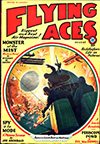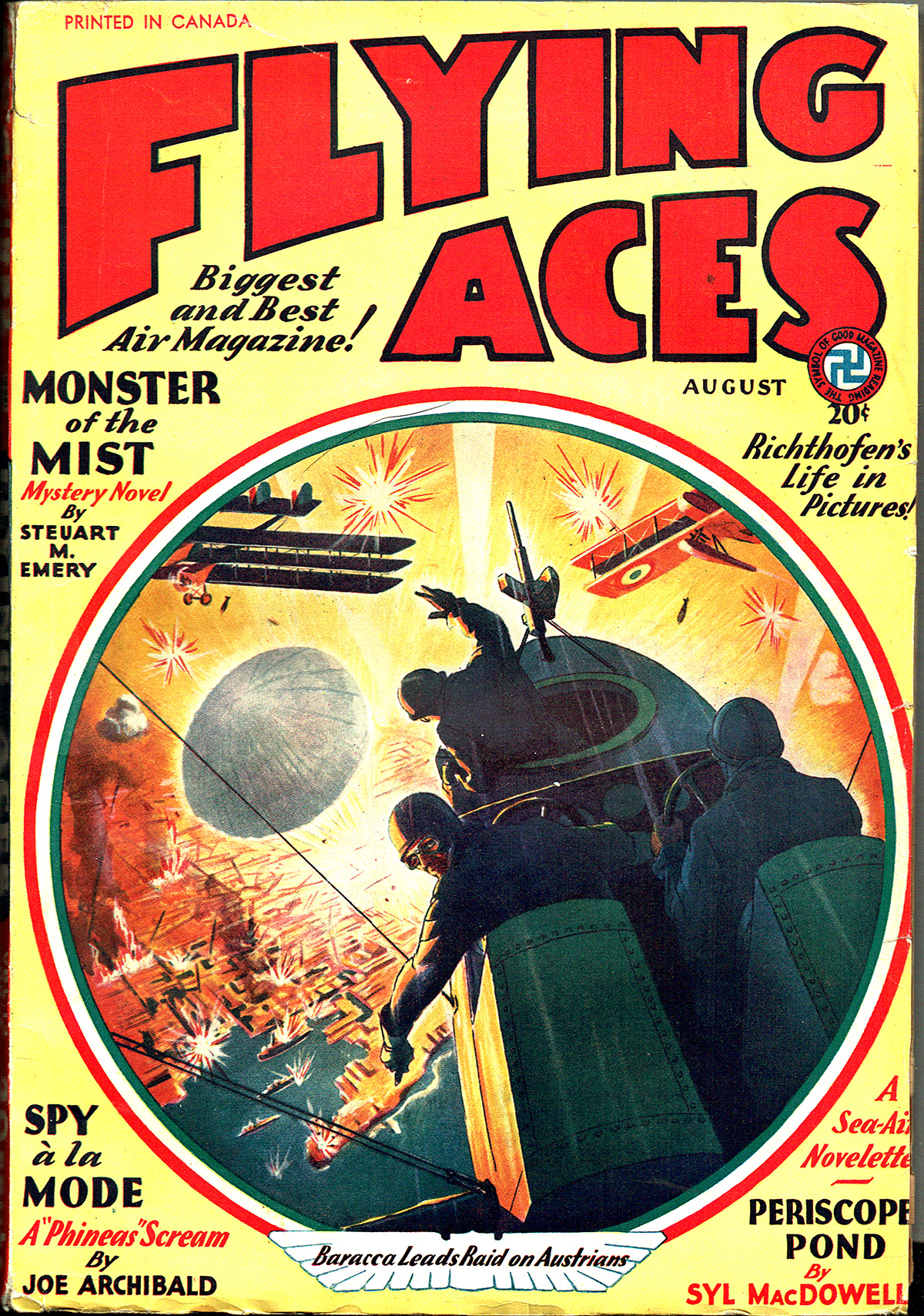“Baracca Leads Raid on Austrians†by Paul Bissell
THIS week we present another of Paul Bissell’s covers for Flying Aces! Bissell is mainly known for doing the covers of Flying Aces from 1931 through 1934 when C.B. Mayshark took over duties. For the August 1932 cover Bissell put us right in the cockpit with Baracca as his squadron bombs the Austrian Naval at Pola!
Baracca Leads Raid on Austrians
 “ALL ships are on the line, sir. Bombs are in racks, and they are ready to take off.” The general’s aide saluted smartly, and the general turned ^o a major at his side, who wore his boots like a cavalryman, but whose silver wings showed him to be an aviator.
“ALL ships are on the line, sir. Bombs are in racks, and they are ready to take off.” The general’s aide saluted smartly, and the general turned ^o a major at his side, who wore his boots like a cavalryman, but whose silver wings showed him to be an aviator.
“You know your orders, major. You will lead the squadron and be guided across by the boats. The planes will follow you at four-minute intervals. When you have found your objective, you will drop your bombs. Captain Barrechi will release his parachute light on the target you designate. After dropping their explosives, all ships will return directly to this airdrome. That is all.â€
And instead of the usual salute he held out his hand, which was eagerly grasped by the major.
The field was an Italian airdrome on the west coast of the Adriatic. The major, unlike most aviators of the war, was not a young man. He had entered the Italian army almost fifteen years before, serving in the cavalry, and rising to the rank of captain. In the first days after Italy had cast her fate with that of the Allies and it became necessary to build up an Italian air force, he had, in spite of his “advanced age,†obtained a transfer to this branch of the service, and had quickly become an ace.
Now he was Major Baracca, the Italian ace of aces. All up and down. the entire front he was known not only as a great pilot, but as one of the great air fighters of the world. With a more matured mind than the younger men, he, though ever searching and participating in personal battles with the enemy, was constantly planning and scheming larger offensive movements—movements using whole groups and squadrons, and inflicting severe damage along the Austrian front. More than seventy successful bombing raids were under his personal leadership. More than a thousand times he crossed the enemy line, seeking battle. In thirty-six of these individual combats he had come away victorious, before finally, on June 21, 1918, fighting against tremendous odds, the bullet bearing his name found its mark, and he fell from the skies, a flaming sacrifice to war.
Tonight, in the late summer of 1917, he was leading one of the largest and most daring of his raids. Over to the east the Austrians, in their naval base at Pola, felt themselves safe from attack in the knowledge that the broad Adriatic lay between them and their Italian foes.
At nine-thirty sharp, the first huge ship took the air. One thousand pounds of high explosives were fastened beneath its wings. Below, stretched out across the Adriatic, was a fleet of power boats, speeding across the dark waters, a hooded light shining from each stern to guide the big planes to their destination. Four minutes later, with huge engines roaring, the second plane took off, and so on at four-minute intervals until the entire force was in the air. Twenty planes were in the first squadron, and twenty-six in the second. Long before the last ship had left the field, the first ship had already dropped its missiles and was on its way back home.
The night was deathly still. Not even a light breeze fanned the smooth surface of the sea below. From three thousand feet up Major Baracca could see the tiny light guiding him—a light which he soon overtook, only to pick up another immediately a few miles farther along and speeding in the same direction. And so he passed from one to another of these moving beacons, until he made out the lights of a city on the dim horizon.
Now the tiny light he had been following flashed brightly twice, then swung out in a wide circle and vanished. It was the signal. In front and below him lay the naval base and arsenal of Pola. The moment had arrived. Carefully he made his calculations and peered searchingly into the darkness below. His must be a direct hit. The naval base itself must be spotted, so that Captain Barrechi might drop his parachute flare directly over their objective.
He signaled to his pilot, who nosed the big plane over into an easy glide, motors throttled down and wires singing. He had made almost a complete circle over the town when his eyes picked up the marks he was looking for. A quick order to the pilot, and the plane flattened out, gliding squarely over the target. The bomber leaned tensely over the side, his arm raised, his eyes carefully lining through the sights on the lights below. A quick signal, a click of levers, a slight waver, and two dark masses detached themselves from below the wings and hurtled downward.
One tense instant, and then, far below, two blinding flashes followed by the sharp, terrific intonation of high explosives. Immediately the night was stabbed by beams of light. Major Baracca gazed, eagerly over the sides to mark his hit. The blinding light of one of the beams caught his ship full in its glare, and shells began to burst around him. But below a sudden burst of flame, as a small store of munitions went off, showed that his bombs had landed in the arsenal area.
THE archies were now bombing him heavily. Machine guns spattered, and flaming onions swept through the night. His motors roared as the pilot gave her the gun, and with a wild feeling of exultation Baracca signaled to swing in a wide circle so as to give Barrechi a chance to drop his light, and give himself the benefit of this light, in dropping his other bombs.
As Barrechi glided down and dropped his flare, there was a sharp explosion, followed by a bright downward rush as of a falling meteor. Then a sharp snap as the parachute opened, and the light floated easily in space, swaying gently and lighting up the scene below. With no breeze, the light hung in the air as if anchored.
This came as a complete surprise to the Austrians, and for some minutes there was panic. Men could be seen dashing madly around; the guns actually ceased firing, and even the searchlights snapped off as if trying to hide from the merciless glare above.
Quickly Baracca saw his advantage, and undisturbed by fire from below, he calmly glided his plane lower and directly over a spot marked with a red X on the map held on his knees. Leisurely and with deadly certainty the bomber sighted; his arm flashed downward, and the levers clicked. Tensely they waited, leaning over the side to watch the two bombs drop straight down, their white fins clearly seen in the brilliant light.
For a split second they seemed to disappear as they landed. Then there was a terrific upheaval. A whole section of the surface below seemed to lift itself up in an attempt to reach the plane above—then, giving up its vain effort, to split into a thousand weird shapes and tongues of flame. Explosion after explosion followed, as one building set off another. Again Baracca’s lever worked, and the giant plane dealt another hand of death from the sky.
Now Barrechi was also releasing his bombs. And plane number three was just entering the circle of light. The archies had commenced their fire again, but their aim was wild, for terror had struck the hearts of the Austrians.
For five hours this bombardment continued. One after another the big Capronis, heedless of the shell-fire from below, coolly dropped their eggs. Forty-six ships came over, carrying death and destruction to the Austrians, and forty-six ships returned safely to Italy, with their bomb-racks empty.

“Baracca Leads Raid on Austriansâ€
Flying Aces, August 1932 by Paul J. Bissell




